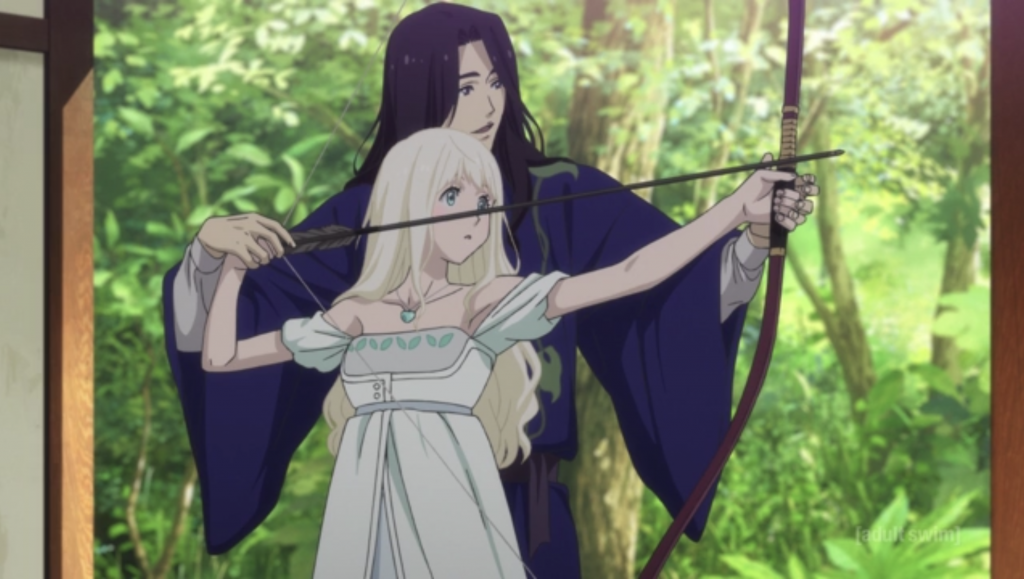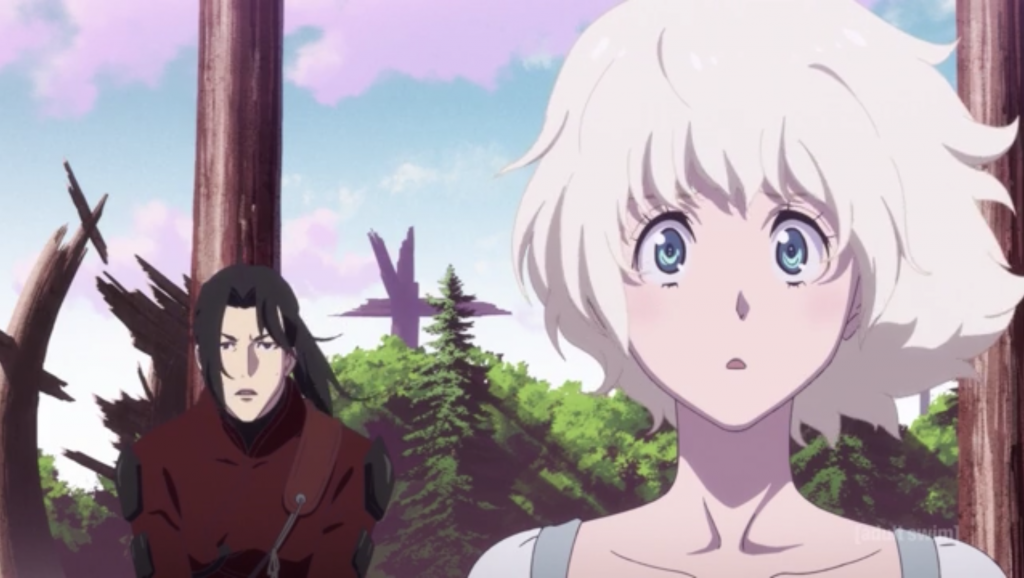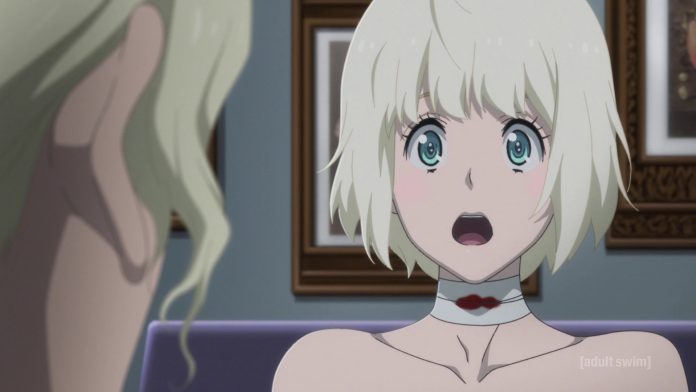Former staff writer Alien Renegade gives his thoughts about the latest Toonami original series, Fena: Pirate Princess, and what he felt resonated with the show as well as some of its shortcomings!
For viewers, the most nerve-wracking thing about original anime shows is that it’s impossible to know whether the show is good or not until it’s done. There’s no source material, no pre-written guides, nothing that’ll signify the overall quality early on. Going into Fena: Pirate Princess, the first of many new Toonami originals in the upcoming slate, I tried to keep my excitement tempered as much as possible. Seeing what happened to the winter season anime Wonder Egg Priority, I knew all too well that it takes one episode for things to go disastrous. It was hard for me not to be excited because the previews gave me Yona of the Dawn vibes, and I’m a sucker for adventure anime. For the first half, watching Fena became the thing I looked forward to the most every week. For the latter half, however, I could only hold on to hope that it would reign in its ambitions, and, unfortunately, it could not.
THE LOWDOWN
The story follows Fena Houtman, a beautiful young woman with a hectic past. Ten years prior, Fena traveled aboard a battleship with her father and a young boy who viewers would later learn is Yukimaru. After the ship got ransacked and destroyed, Fena was sent away on a lifeboat, with her dad telling her to “find Eden” and the young boy promising that he’ll find her again. Present-day, Fena is at the age where she’s able to be sold off to a royal for pleasure, until two strange men, a dog, and a group of pirates show up at her home, with a mission to help Fena fulfill the task her father gave her.
THE CHARACTERS
Fena: Pirate Princess has an expansive and varied cast of characters, although most tend to be accessories to the overall package. The story revolves around three major groups: the protagonistic force of Fena and the Goblin Knights/crew of the submersible Bonito II, the antagonistic force of Abel and the British Royal Navy, and the chaotic neutral force of the Rumble Rose Pirates. For their intended uses, the minor characters fulfilled their roles perfectly. While I am disappointed that we didn’t get much intimate time with the rest of the Goblin crew, they were fantastic friends. There were numerous times during my weekly impressions on Twitter where I praised the comedy and character interactions because they were indeed a lot of fun to watch. As cool as they were, I’m still disappointed that we didn’t get more of the Rumble Rose crew. I feel like they could’ve made much more of an impact than the one time they kidnapped Fena. I was hoping they would be along for the ride during the final confrontation, but unfortunately, they walked the plank much too early in the series.
Overall, the main focus of development tended to veer towards Fena, Goblin Knight members Yukimaru and Shitan, and the main villain Abel. The relationship between Fena and Yukimaru is one of the series’ highest points. The two have great chemistry, wonderfully charming interactions, and decent romantic progression. Shitan was a mysterious character that was just shy of being great. They gave him a few complexities in the form of wavering loyalty that could and should have shaken things up more, but the story didn’t follow through, making him look more like a victim of abrupt flip-flopping rather than a character with steady development. The (somewhat justifiably) twisted Abel gave the show the edge it needed to successfully raise the stakes at the right times. I enjoyed him as a character, but the series could have stood to spend just a tad more time getting to know him and his mindset more than just “Helena, Helena” over and over again.
Honestly, the most disappointing character in the series for me was none other than the eponymous character herself, Fena. I didn’t know what to expect from the series in general, so I gave her an honest chance. Yet, I can’t help but feel like she had so much more potential for growth than she was given. The show’s subtitle calls her a “Pirate Princess,” but I’m rather disappointed that they seemed to lean more on the “princess” side of her than the “pirate” side.
It’s still baffling how they dedicated an entire half of an episode to her attempting to learn a weapon (and was also given a knife later on) only for the results of that training never to be seen. Considering her headstrong personality, you’d think she would brandish a sword at least once. Instead, Fena was practically boiled down to an odd damsel-in-distress/human GPS combination whose only shining moments came when the writers decided it was time to force the plot forward. I did appreciate the one moment of existentialism that she had, which gave her some much-needed depth and exploration of her character thus far. Otherwise, I wish she was more of a factor in the plot and less of a product.

THE STORY
Fena: Pirate Princess has a simple enough base concept on paper: Royal girl hates royal life, royal girl leaves with a group of ragtag misfits, they must go somewhere, they have adventures, the end. It could have very much been a straightforward adventure anime, but Production I.G. spun for a fleshed-out universe with a detailed mythos and expansive worldbuilding. In addition, the world of Fena feels unique and colorful, mixing the swashbuckling escapades of pirate life with some modernized technology, allusions to real-life historical events, and a touch of the supernatural. These concepts interwoven within the story give the series a universe that’s way better than the sum of its parts.
Unfortunately for Fena, this sum ended up being more than the show could handle.
You hear this general sentiment all the time from anime fans: “I wish this series had more episodes.” That’s precisely how I felt about Fena: Pirate Princess. Fena’s most prominent issue from a storytelling front by far is the lack of proper buildup to important moments. I was having a wonderful time with the series’ first half setup, but by episode 8, I realized that there might not be enough time to resolve or fully explore the concepts they introduced earlier. Regrettably, that happened to be the case. While cohesive enough to not pull random plot points out of thin air (your mileage may vary on the final revelation of Cody), the series still suffers from a lack of proper time management. By episode 11, I already resigned to the fate of the many burning questions I had about the series being left unanswered. Why was Yukihisa so hellbent on Shitan killing Fena? Why was Kei brought up so frequently as this object of fear only to never be seen interacting with the crew? What’s the deal with Abel’s color-changing eyes? And many, many more.
Analyzing it further, the pacing took the sharpest turn in the latter acts, going from a deliberately slow yet comfortable pace to a near-inexplicable frenzy. Some of the new concepts introduced and their resolutions did not receive the same care as the earlier episode’s worldbuilding, especially the main antagonist’s character arc. Abel’s story is conceptually sound and had the makings to be a very heartbreaking tale. Still, the lack of buildup diminished the intended effect significantly, diminishing what should have been an entire episode plus a few intermittent flashbacks’ worth of plot into a meager half an episode. The resolution to the arc and the end of Abel felt unsatisfying due to the above reasons, and his “happy” ending left me with a bitter taste in my mouth.
Speaking of ends, there’s a lot I can say about the series’s conclusion. Although the final twist was lightly foreshadowed throughout the series (“Will you choose blue waters or storm clouds?”), Fena: Pirate Princess wasn’t given enough time to thoroughly weave those ideas into the world they spent such a long time building. The result: the first half of the finale ended up being an uncharacteristic and lengthy exposition dump, and the latter half was a rush job of an ending that lowered the intended emotional impact.

Seeing the middling execution of these events play out over the weeks put an extra damper on my feelings. By the time the series was over, I had looked at scenes that I previously thought were charming and gave Fena character as extraneous and unnecessary in the grand scheme of things. They intrinsically aren’t excessive, but the lack of time to develop the most critical parts of the series is too big a problem for me to ignore (did we need two whole episodes of Fena being a compass?). I wish they could’ve been able to find a better balance between everything. Yet, the only probable solution that would allow Fena to keep its unique identity along with its ambitious concepts is “more episodes.” There were so many great ideas and an extremely solid blueprint laid down, but the invention itself wasn’t given enough time to work as planned.
THE VISUALS
The series’ lackluster storytelling is carried by its fantastic production quality. Fena absolutely benefited from not being constrained to the typical seasonal anime schedule because it looks great. I’m talking “every other frame could be a desktop wallpaper” levels of great. Every episode had breathtaking, near-movie quality backdrops and scenery at every turn. You can tell that the artists put the utmost care into bringing the world to life. In motion, it looks even better. Fena’s animation sports levels of detail unheard of for a twelve-episode series. Overlooked subtleties such as wind effects (seriously, pull up episode 4 and witness the black magic of Arya’s hair) and body language add so much life into the visuals, and I’m grateful that Production I.G. didn’t cut corners there. One of the most fantastic examples of the animation detail happened in episode 7 when Abel obliterated the Rumble Rose Pirates’ ship. The way the cannon shell ate away at the ship’s rigging before exploding, and especially how the explosion was shown as a gradual spread rather than an all-at-once kaboom, was nothing short of eye-popping.
THE AUDIO
Everybody involved with the voice acting of Fena: Pirate Princess deserves the biggest of standing ovations because wow. What. A. Cast. Brittany Cox as the leading lady Fena, was so perfect of a choice that I feel “perfect” is too weak a word to describe her performance. It took all of five minutes for me to adore Fena to bits, and that’s not an easy feat. The rest of the Goblin Pirates, regardless how much or how little they spoke, were supplemented by perfect casting choices and stellar performances. I could go on and on about every individual actor’s performance, but that would probably be as long as this whole review in general. Show them all love because they deserve it.
Voice work aside, the rest of the sound design doesn’t slouch either. Crafted by acclaimed composer Yuki Kajiura (Sword Art Online, Demon Slayer), the soundtrack is perfectly atmospheric. The musical pieces set the scene perfectly, and I loved the changing of different styles and feels depending on the area. The use of frequent vocals during a lot of the Eden memories scenes was a perfectly chilling touch as well. Combine all of the above with perfect sound effects, and you get a masterclass in immersive audio.
THE VERDICT
Fena: Pirate Princess is a visually beautiful series with a fascinating universe too ambitious for its own good, and no amount of pretty setpieces or beautiful sounds can fix that. There’s a lot of potential that can be explored in this world, so I wouldn’t necessarily mind a continuation if the crew of the Bonito II decides to set sail again. For now, though, all I’m left with is a treasure trove of disappointment over what could have been.
Score: 5/10
Pros:
- Stunning audiovisual direction backed up by impeccable cinematography and detailed animations
- Charming and eclectic cast of characters
- Top-shelf voice acting
- Interesting universe and plot concepts…
Cons:
- …that were unfortunately dropped entirely, left unresolved, or given an unsatisfying conclusion before they could be fully realized
- Extreme pacing whiplash in the bottom half, sending the show from a steady ride to a torrential cluster of ideas
- Fena is relegated to a walking plot device for the majority of the series
How you can watch: The series is streaming on
- Crunchyroll (Japanese w/English subtitles)
- The official Adult Swim website and the Adult Swim app (English dubbed)
AmpRen (previously Alien.Renegade) is a former staff writer for Toonami Faithful, frequent guest on the Toonami Faithful Podcast and Demon Slayer Podcast, and a music producer/rapper known for creating the “Alien.Renegade’s Toonami Beats” series of mixtapes. You can follow him on Twitter @AmpRenLetsRide.

